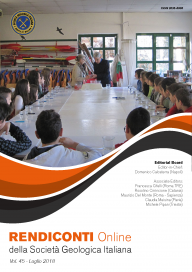
Learning of Geological Time in a Sample of 9th Grade Italian Liceo Students
Giulia Realdon (a), Eleonora Paris (a), Chiara Invernizzi (a) & Laura Zulini (b)
(a) UNICAMearth - Scuola di Scienze e Tecnologie - sezione di Geologia - Università di Camerino, via Gentile III da Varano, 62032 Camerino, Italy.
(b) I.S.I.S. Brignoli-Einaudi-Marconi, Gradisca d'Isonzo, Italy.
Corresponding author e-mail: giulia.realdon@unicam.it
Volume: 45/2018
Pages: 59-67
Abstract
Geological time is a pivotal concept in Earth sciences and many Studies deal with it, but only few are interventional and none is known in Italy.
We performed a study on the learning of geological time through a randomized controlled trial among 298 ninth grade liceo students of Friuli Venezia Giulia (Italy), including a pre-test, a short lecture, a post-test and a delayed test. Sample classes were randomly allocated to the experimental group (constructivist-style teaching) or to the control group (cognitivist-style teaching).
Test scores displayed a significant improvement after the teaching and in the delayed test in both groups. Among students obtaining equal or better scores in the post-test, experimental group performed significantly better than control group.
Science teachers of the same sample were also involved in the study. Few of them were familiar with misconceptions and taught geologic time, all showed a mix of post-cognitivist, cognitivist and behaviourist teaching approaches.
Keywords
Get Full Text